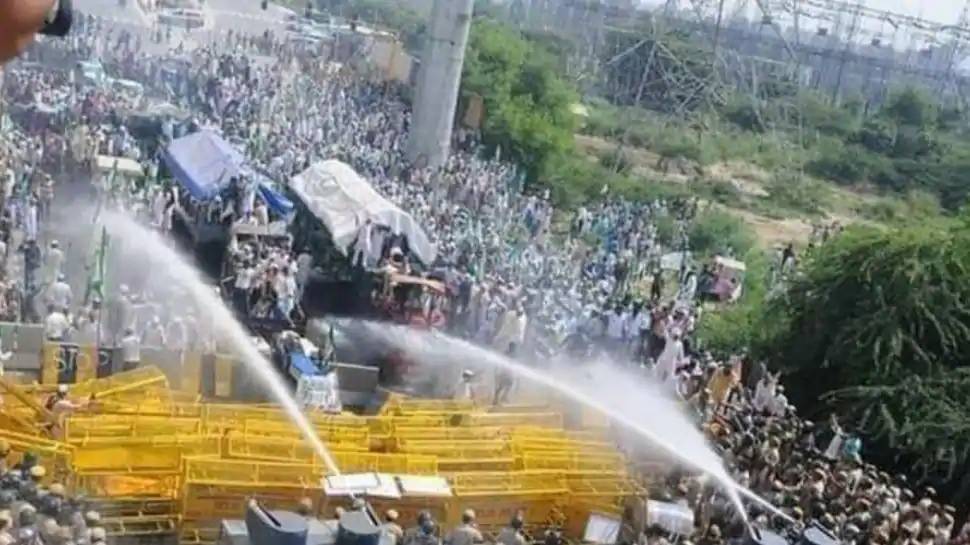Protests against the central laws and policies continue in multiple places in the country.
Few days back, a nationwide general strike was called by trade unions in protest against the central government’s economic policies, specifically the three farm laws. The strike had impacted lives in left-ruled Kerala and some parts of West Bengal and in coal-rich areas of Jharkhand. Elsewhere in the country, the strike had limited impact.
In West Bengal, train services were disrupted and roads were blocked during the protests. The strike in Bengal comes in an environment when the TMC leader and former minister Suvendu Adhikari, who resigned recently, is at the centre of a political debate regarding his future with TMC. The strikes in the state heated up the political space a few months prior to the upcoming Bengal election of 2021. Supporters of the general strike clashed with the police at multiple places in West Bengal. At certain places, passengers were asked to get off the buses, which were stopped by the strikers. Shops were damaged in central Kolkata where protestors hurled bricks. In Cooch Behar, the strikers broke the windshields of buses. At Taratala in Kolkata, a scuffle broke out between the police and BJP workers who organized a rally against the strike. The police caned the activists and arrested a few of them. Police had to use force to disperse crowds and clear the traffic in many places such as Barasat, Kamarhati, and Durgapur.
Shops had downed their shutters and most buses had remained off the roads at numerous places. In Kerala, the only state in the country ruled by a Marxist government, life was badly hit as the 24-hour protest, called by a central committee of trade unions, and had hit all major sectors, including government offices, banking and insurance. Pilgrims heading towards the hill shrine of Sabarimala in Kerala were spared by the strikers. Kerala State Road Transport Corporation buses operated on the temple route, carrying pilgrims. In some districts, small store owners complained about the strike hurting their earnings at a time when they are already struggling in the aftermath of Covid-19. The countrywide strike had been called to protest against new farm and labour laws that the trade unions believe would promote corporate interests at the expense of farmers and workers.
Due to the Covid19 pandemic, the trade unions had shunned mass rallies and instead had organized limited protest meetings and formed human-chains across Kerala. Protest rallies with a limited number of people were organized at the state-level inauguration by Centre of Indian Trade Unions (CITU) at Gandhi Park in Thiruvananthapuram, following social distancing norms. In Jharkhand, the strike was complete in the coal-rich areas of Bakora and Dhanbad, where unions had held protest rallies and prevented buses from plying. In other towns of the state such as Ranchi and Jamshedpur, the impact was partial.
Trade unions such as the Indian National Trade Union Congress (INTUC), All India Trade Union Congress (AITUC), Hind Mazdoor Sabha (HMS), Centre of Indian Trade Unions (CITU), All India United Trade Union Centre (AIUTUC), Trade Union Co-ordination Centre (TUCC), and Self-Employed Women’s Association (SEWA) joined the strike. BJP-aligned Bharatiya Mazdoor Sangh (BMS) did not participate in the strike.
All of this comes in a parallel development when the farmers from Punjab and Haryana are protesting at Delhi braving water cannons, cold and tear gas shells. Raising slogans, singing songs and carrying flags in reds, greens, and blues, around 400 farmers with affiliations to different outfits from a number of states on Saturday gathered at north Delhi’s Burari ground where they have been permitted to hold a peaceful protest against the new farm laws. While thousands of farmers stayed put at the Singhu and Tikri borders of Delhi for the third consecutive day amid heavy police presence, many made their way into the national capital and gathered at the Nirankari ground, one of the largest in the city. The farmers, mostly from Punjab and Haryana and also from Madhya Pradesh and Rajasthan, arrived in trucks and tractors in the city.
The author is a student member of Amity center of Happiness





